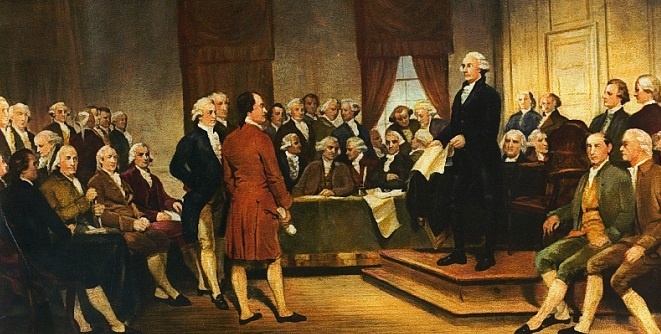INSTITUTE INDEX: The pro-slavery, anti-democratic history of the Electoral College

The founders of the United States deferred to the demands of slaveholding states in rejecting popular election of the president for the Electoral College system, which a growing number of states are rejecting. (Painting of the Constitutional Convention of 1787 by Junius Brutus Stearns.)
Year in which America's founders rejected popular election of the president because it was disfavored by Southerners, who feared their region with its heavily slavery-dependent economy would be outvoted by the North: 1787
Portion of credit Southern states got for each enslaved resident for the purposes of apportioning representatives to the House of Representatives, which in turn determined the number of electors they got under the compromise winner-take-all Electoral College system the founders settled on: 3/5
At the time, number of residents of the South who were enslaved and could not vote: 500,000
Rank of Virginia among the big winners under the Electoral College system due to its massive enslaved population: 1
Percent of Virginia's population that enslaved people accounted for at the time: 40
Under the 1800 census, percent fewer electoral votes Virginia got than the free state of Pennsylvania, which had far more eligible voters: 20
Of the first 36 years under the U.S. Constitution, number in which a slaveholding Virginian occupied the presidency: 32
Year in which the U.S. adopted the 12th Amendment to the Constitution that fixed electoral college problems caused by the emergence of national political parties but that also preserved the pro-slavery bias and failed to discourage states from embracing discriminatory voting laws by not incorporating incentives to expand the franchise to excluded groups like blacks and women: 1804
Percent higher voter turnout was in 2004 than in 2000 but with most of the gain limited to battleground states because of the Electoral College, which does not incentivize increasing turnout everywhere like a popular vote system does: 5
In the 2016 presidential race, portion of the general election campaign events that were held in just six states key to the Electoral College outcome: 2/3
Number of times in U.S. history a presidential candidate has lost the popular vote but won the White House due to the Electoral College system: 5
Number of times that's happened this century alone, including in this week's election of Republican Donald Trump: 2
Year in which the National Popular Vote Interstate Compact was created to encourage states to award all their respective electoral votes to the presidential candidate who wins the overall popular vote in the 50 states and the District of Columbia: 2006
Number of states that have passed the compact's National Popular Vote bill to date: 11
Combined electoral votes in those states: 165
Number of total electoral votes that the states which are part of the compact would need to effectively abolish the Electoral College: 270
Number of states where the National Popular Vote bill has passed at least one legislative chamber: 23
Number of those chambers that are in Southern states: 1*
Of the Americans who know what the Electoral College is, percent who say it should be abolished: 56
Date on which Trump himself tweeted, "The electoral college is a disaster for democracy": 11/6/2012
* The North Carolina Senate, in 2007.
(Click on figure to go to source.)
Tags
Sue Sturgis
Sue is the former editorial director of Facing South and the Institute for Southern Studies.
